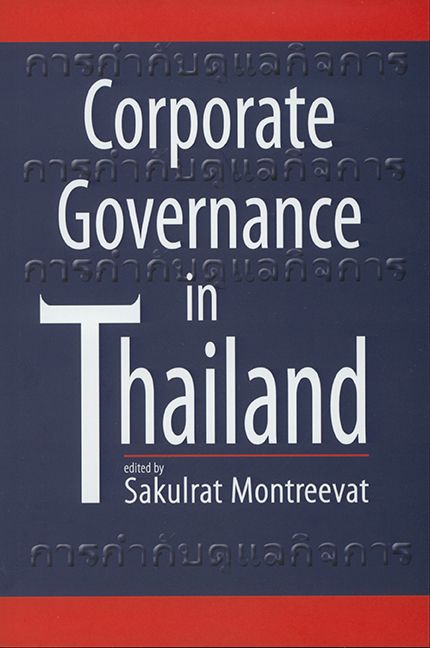Book contents
- Frontmatter
- Contents
- List of Tables
- List of Figures
- List of Abbreviations
- Acknowledgements
- Contributors
- Introduction
- 1 Transparency and Accountability of Listed Non-Financial Companies in Post-Crisis Thailand
- 2 Good Governance in the Thai Banking System
- 3 Corporate Governance among State-Owned Enterprises in Thailand
- 4 Thai Company Laws and Good Governance Practices of Unlisted Companies
- Concluding Remarks
- Index
3 - Corporate Governance among State-Owned Enterprises in Thailand
Published online by Cambridge University Press: 21 October 2015
- Frontmatter
- Contents
- List of Tables
- List of Figures
- List of Abbreviations
- Acknowledgements
- Contributors
- Introduction
- 1 Transparency and Accountability of Listed Non-Financial Companies in Post-Crisis Thailand
- 2 Good Governance in the Thai Banking System
- 3 Corporate Governance among State-Owned Enterprises in Thailand
- 4 Thai Company Laws and Good Governance Practices of Unlisted Companies
- Concluding Remarks
- Index
Summary
Much has been written about the governance of private enterprises, but very little on the governance of state-owned enterprises (SOEs). This is surprising considering that state enterprises continue to contribute a significant share of the national gross domestic product (GDP) in many countries, in particular, developing countries where the markets are not truly open to private competition. In case of Thailand, state enterprises contribute to a quarter of the country'sGDP. A probe into the governance of government enterprises is therefore long overdue.
The privatization trend has swept across the globe. Almost every country, large or small, most developed or least developed, has privatization on the list of its policy agenda. This is a result of increasing intolerance with inefficiencies that are inherent in most SOEs. The transfer of state ownership to private hands is expected to improve efficiency through the elimination of bureaucracy, mobilization of fresh capital, and superior supervision, and business acumen from private owners. Unfortunately, from experience, these improvements may not be forthcoming if competition or effective regulatory oversight is not in place. Privatization may lead to a deterioration in the quality of goods and services as private owners seek to cut costs, or to raise prices as they seek to maximize profits. Therefore, privatization is indeed not a panacea for the ills of SOEs.
In countries where rules and regulations have not been fully developed or the capacity to regulate is limited, state ownership of uncontestable markets may be superior to private ownership. It is easier to regulate government-owned enterprises as corporate information is much more easily accessible compared with private enterprises.
It is also easier to carry out social policies through a state enterprise than through a profit-maximizing private enterprise when universal service rules are not yet clearly established. That being said, state enterprises are, however, subject to two major downside risks — political intervention and state bureaucracy — which contribute to corruption and inefficiency. But there is much that can be done to reduce such risks, such as working towards greater transparency in key decision processes, holding executives accountable for their actions or allowing greater participation among stakeholders, and so forth.
- Type
- Chapter
- Information
- Corporate Governance in Thailand , pp. 54 - 84Publisher: ISEAS–Yusof Ishak InstitutePrint publication year: 2005



